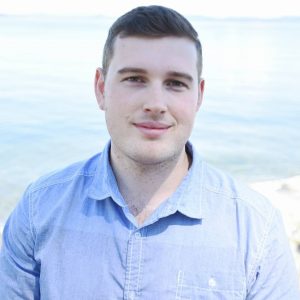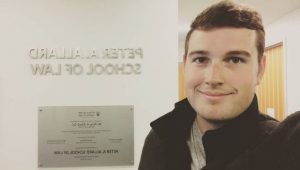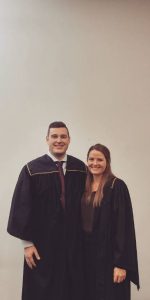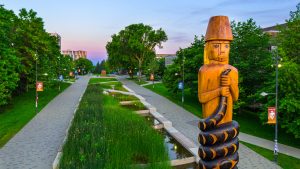Hello Class of 2020!
 My name is Brendon Easton and I am a 2L here at Allard. I was born and raised in Victoria BC, and am a citizen of the Namgis First Nation. I completed my undergraduate studies at the University of Victoria with a BA in Political Science and a minor in Business before coming out here to pursue a legal education. I am also this year’s 2L rep for the Indigenous Law Students’ Association.
My name is Brendon Easton and I am a 2L here at Allard. I was born and raised in Victoria BC, and am a citizen of the Namgis First Nation. I completed my undergraduate studies at the University of Victoria with a BA in Political Science and a minor in Business before coming out here to pursue a legal education. I am also this year’s 2L rep for the Indigenous Law Students’ Association.
As part of our commitment to the Indigenous community, the orientation team has asked if I would like to highlight some frequently asked questions regarding territorial acknowledgements, terminology, the Indigenous Legal Studies Program, and the Indigenous Law Students’ Association. The following was produced with the help of faculty and students here at Allard.
Q: What are Territorial Acknowledgements?
“I would like to begin by acknowledging that the land on which we gather is the unceded territory of the Coast Salish peoples, including the territories of the xʷməθkwəy̓əm (Musqueam), Skwxwú7mesh (Squamish), Stó:lō and Səl̓ílwətaʔ/Selilwitulh (Tsleil-Waututh) Nations.”
This is something you will hear in your first week of law school, but what does it mean? A territorial acknowledgement is more than just a cultural or traditional practice; it is an exercise in legal pluralism. By using the laws of the territory, within a Canadian legal institution, we are asking for permission to conduct our business here. It is more than just ticking a box. This is a call for listeners to recognize where they are, and to understand the privileges and benefits they receive from being situated on the land. We acknowledge traditional, ancestral and unceded territory to instill a sense of commitment in each listener to the Indigenous nations who have rightful claims to this land. Whether we are racialized settlers, or white settlers, we all claim different privileges, and have different struggles, and yet we all still benefit from colonialism and dispossession of Indigenous lands.

With that in mind, one of the first events you will attend at Orientation will be a Musqueam welcome. This is an opportunity to be mindful of our place on the land, and our commitment to relationship with the Indigenous community as we work towards reconciliation. If you have a moment, stand in front of the Reconciliation Pole outside the Faculty of Forestry. Note that the Reconciliation Pole is another example of legal pluralism. It is more than just a fine work of art, but rather a powerful and constitutive authority meant to capture the long trajectory of Indigenous and Canadian relations and to ensure that one part of that, the history of Canada’s Indian residential schools, will never be forgotten.
Q: What word am I supposed to use? Indian, Native, Aboriginal, Indigenous?
The First Peoples of this land have unique communities with unique names – prior to European contact there wasn’t a need for collective nouns or complicated terminology. In the time since contact and colonization, the government engaged in a practice that required Indigenous people to be labeled for ease of governing, a process that distorted certain familial ties in recognition of others.

The term “Indian” was used by the settlers to describe those of Indigenous ancestry. While it is now outdated, it remains as a legal term in the context of legislation such as the Indian Act. The term Aboriginal is an English word derived from Latin. The root meaning of the word “ab” is a Latin prefix that means “away from” or “not” – so Aboriginal can mean “not original”. Despite its powerful critics, we still see the word “Aboriginal” used widely by government, business and media. It follows that the term “Aboriginal”, like its predecessor, has become institutionalized as part of the Charter’s section 35 framework. The term “Native” is so broad that it is perhaps meaningless. However, this term is still used by some organizations and non-profits, many of whom recognize the space the term occupies within the public sphere and within Indigenous communities.
“Indigenous” is collective noun for First Nations, Inuit, and Métis, and is growing in popularity in Canada. It is a more all-encompassing term to describe the people who resided on this land prior to European contact. The term has gained global popularity with human rights documents such as the Universal Declaration on the Rights of Indigenous Peoples. This is a long winded explanation to say that the Indigenous peoples of Canada have done much to reclaim their identity through processes of decolonization, reclamation, and revitalization. As prospective lawyers we should understand that language has power. Where you can, try referencing the particular nation, community or the familial group, and if you are ever in doubt about what term to use, just ask!
Q: What is the ILSP? What is ILSA? What can I join if I identify as a settler?
The primary objective of the Indigenous Legal Studies Program (ILSP) is to enhance Indigenous involvement in the legal profession by providing a legal education relating to Indigenous issues, and supporting the legal education of Indigenous students. In addition, the ILSP directors and staff, provide faculty with an awareness of the issues facing the Indigenous community, as well as programming to help the Allard community forward the goals of reconciliation.

Students in the ILSP have been admitted to Allard Law through the Indigenous category as part of Allard’s commitment to addressing issues such as the underrepresentation of Indigenous peoples in the legal profession, the rectification of historical wrongs, such as the Indian Act prohibition on accessing legal counsel, and the lack of culturally appropriate sentencing and rehabilitation options available. If you want to learn more, check out the ILSP website to see a full list of programming as well as a picture of some of the Indigenous students and faculty here at Allard.
The Indigenous Law Students’ Association (ILSA) is a club at Allard that is open to both Indigenous and non-Indigenous students, with the express goal of fostering a greater awareness, of Indigenous issues. ILSA hosts many events throughout the year with the hope of generating conversations and solutions regarding the legal, economic, and social problems facing the Indigenous community. If you are interested in getting involved, come meet an upper year student representative at club day in the first week of school – all are welcome!
